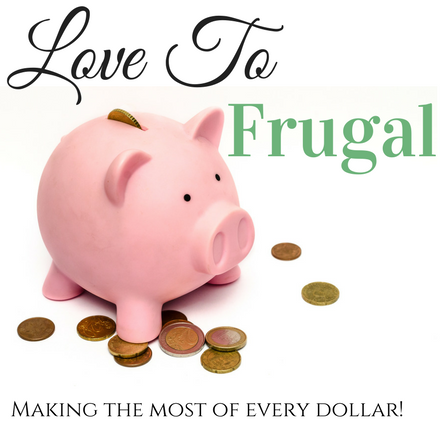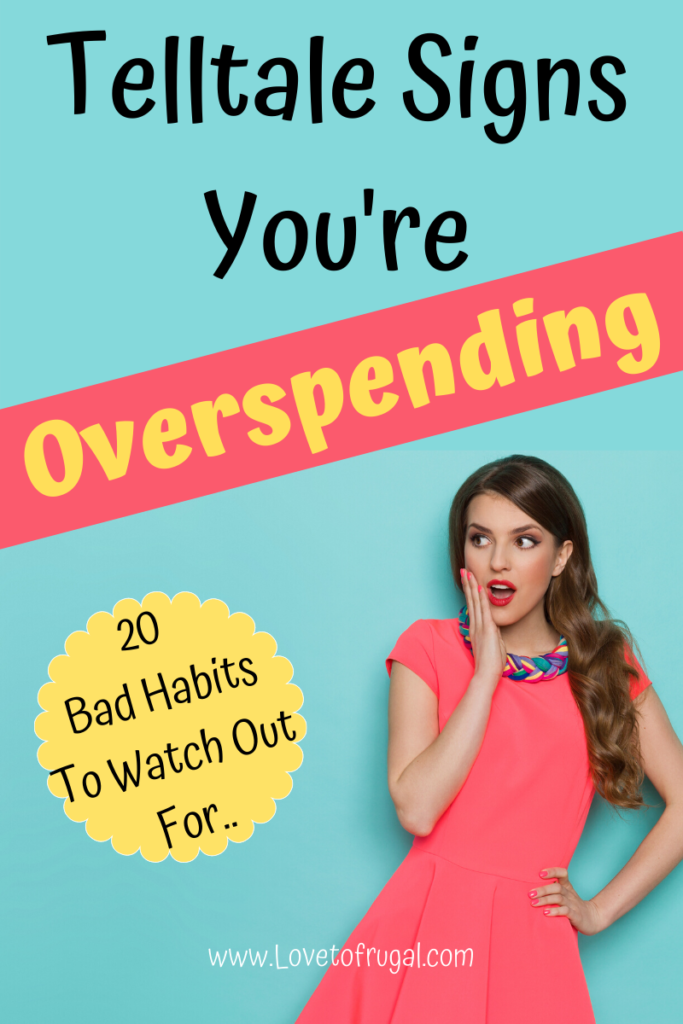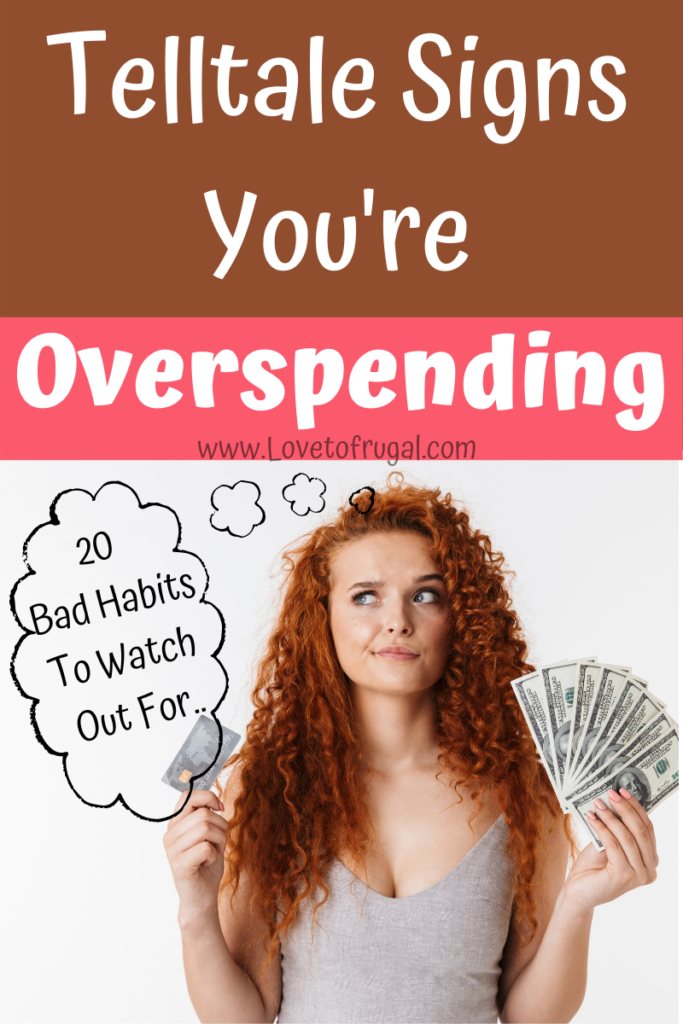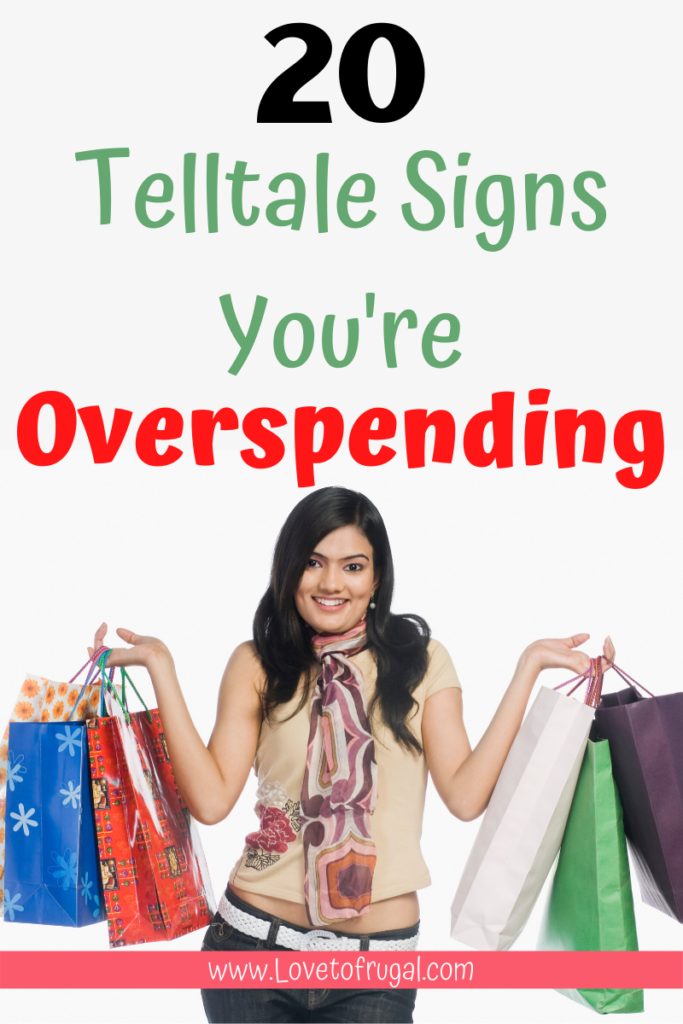Signs You’re Overspending And Sure Fire Ways To Stop!
Do you ever feel like you have more month than money? We all have some months like this, but if you find that this is your normal, that may be one of many signs you’re overspending.
There may be several reasons for this and maybe they’re good ones, like job loss, hours cut, illness or any other unexpected events in our lives. But…if this is happening more and more frequently, this could be a sure sign you’re overspending…plain and simple.
I’ve put together a list of 20 signs you’re overspending so you can take a good, hard look at your situation and see if you may be guilty of some (or several) of these habits that are causing you to go into debt and compromising your journey to financial peace.
*This post may contain affiliate links. For more information, see my disclosure page.
Signs You’re Overspending And Sure Fire Ways To Stop
Here they are in no particular order:
You have no budget
For some, the word “Budget” is a dirty word, but it shouldn’t be. A budget is just a plan for your money…plain and simple. When you have no budget, it’s so easy to lose track of where you’ve spent your money. If you actually write down your income and expenses, you’re able to see where the leaks are in the the budget. In a way, it’s your road map for your finances. Like Dave Ramsey says, “If you don’t tell your money where to go, you’ll be wondering where it went”.
If you don’t know where to start with budgeting, check out How To Do A Zero Based Budget And Why They Work. This will walk you through, step by step, on how to start your budget and how you should spend every dollar on paper…on purpose.
You have no emergency fund
Did you know that 69% of Americans have less than $1,000 in savings? What’s even worse is 45% of Americans say they have $0 in savings!! That’s right! Nada…Zippo..Zilch!! To me, that’s one of the scariest places a person can be, because we all know that life’s gonna happen.
If you’re having trouble scrounging up $1,000, it could definitely be one of the signs you’re overspending in other areas. It’s imperative that you take care of this as soon as possible.
Dave puts this step as #1 on his “baby steps” and there’s good reason for it. If you have at least $1,000 in a starter emergency fund, when life happens, you’ll be able to draw from that fund instead of reaching for a credit card or borrowing from someone. It’s how you begin to break the debt cycle.
You don’t want to talk about your finances
When your finances are messed up and out of control, who wants to be reminded of that? I know it can be depressing AND embarrassing, but ignoring your financial train wreck won’t make it go away. It’ll just make it worse.
Now, I don’t mean talking about your finances to just anyone. If you’re married, you NEED to talk and communicate with your spouse about your finances. You can accomplish so much more, financially, if you make it a team effort. Setting goals and working together is a huge part of making progress and it will definitely help you get ahead.
If you’re single, you may not want or have anyone that you share your financial situation with, but having an accountability partner may be what you need to help keep yourself in check. This could be a trusted friend or family member or even a financial adviser.
Just remember…hiding from the truth will not set you free. If your situation is less than ideal, it’s better to confront it earlier rather than later.
You have no idea who you owe
When you don’t know who you owe, it can be very difficult to sort out a financial mess. You SHOULD have some idea who your creditors are and how much you owe each one.
A good place to find out who you owe is the credit reporting agencies, like TransUnion, Equifax, and Experian. Creditors report to at least 1-2 of these agencies every month. It’s also a good idea to check on your credit status to see if you’ve been a victim of identity theft.
You’re entitled to one free copy of your credit report every 12 months from each of the three nationwide credit reporting companies. You can order online from annualcreditreport.com, the only authorized website for free credit reports, or call 1-877-322-8228.
You pay bills late
We all, at sometime or another, have accidentally forgotten to pay a bill, but if this is becoming a regular occurrence, it’s likely costing you a lot more money. Late fees are steep, not to mention additional interest charges and possibly NSF charges if you end up overdrawing your account.
The best way to avoid this is to set up Autopay on your bills and know how much money you have in your account. This is where having a budget comes in handy.
You’re overdrafting often
If you find that you are overdrafting your account more and more frequently, that’s what Dave Ramsey calls a sign of “crisis living” because that means you are spending more money than you have and then resulting in you spending even more money on the fee that you have to pay because you loaned money from the bank.
Overdraft fees are expensive, but there are several ways to avoid this from happening. The first being, turn off the over draft protection on your account. If you swipe your debit card and the money is insufficient, the transaction is declined…plain and simple. The second way is to monitor your account closely. If you have set up autopays, you need to have the money in the account to cover them.
Again…this is where having a budget comes in. You have to know how much money you have and where it’s going. Period.
You only pay minimum on debt
Paying minimum payments means you are buying “stuff” with credit. It’s fine to use your credit card, but only if you can pay the balance off, every month. When you pay only minimum payments, that means you are accruing interest charges which, in turn, means your balance is going up…not down. The result is you are going deeper into debt. If you can’t pay the balance off each month, that can be one of the clear signs you’re overspending.
You have a packed closet
When you go into your closet, do you see price tags dangling from your clothes? Is your closet packed so tight that it’s a struggle hanging things up? Have you found items that you forgot that you had bought? These are all signs that you could be overspending, especially in the clothes department.
Don’t buy something just because it’s ON SALE. It’s not a deal if you really don’t need it or just because you think you “might” need it in the future.
A closet purge may be in order and you may be able to sell some things, but you’ll never get what you paid for it. Most of the time, donating is what we end up doing. I’m not saying that’s a bad thing, but it would have been so much better not to have wasted money on something you wore very little or didn’t wear at all.
You practice retail therapy…a lot
Let’s face it…shopping can be fun! I’ve been known to practice retail therapy a time or two, over the years.
Retail therapy is an actual thing. So many people use it to cope with stress, depression, anxiety…you name it! The result of retail therapy is a temporary high you get from buying yourself something nice, whether you need it or not.
The problem comes from how it may affect your finances. If you keep your purchases within your spending budget, you likely won’t see any negative impact.
But if you spend more money than you have, you may end up with significant levels of debt over time, leading to even more distress.
The key here is to set a budget amount (for whatever you like to shop for) and stick to it! Also, only shop for something when you actually NEED it. Don’t go shopping to pass the time or to wander aimlessly around the store. Most likely, you will find something to spend money on and the cycle will continue.
Use credit to maintain your lifestyle
Do you use credit cards to take vacations, buy clothes, go out to eat?? The list could go on and on, but if you’re trying to hang on to your lifestyle by way of the credit card instead of paying cash for these wants, this is one of the biggest signs that you’re overspending.
One of my favorite ways to combat credit card spending is to use the cash envelope system. You can budget for expenses like these and use cash instead of credit. When the envelope is empty, you’re done spending. If you’re putting these types of expenses on credit, though, this is definitely one of the clear signs your overspending.
Car payments
Everyone has car payments…right? Maybe so, but if you are buying or leasing a car you can’t afford, you may need to think about downgrading your vehicle.
The average new car payment is around $545 a month and interest rates on vehicle loans have been steadily increasing. The last I checked, rates were a little over 6%. No wonder so many people are living paycheck to paycheck.
What’s really sad is your beautiful new car will lose 60% of its value within the first five years!
Here’s a good post from Dave Ramsey that tells you exactly what The Truth Is About Car Payments.
Your credit limits are maxed out
Do you play the credit card juggling game? Do you max one credit card out only to open another one and repeat the process? I’m not going to say too much about this one other than this is a very dangerous game of financial roulette and it will get you nowhere but DEEP into debt. This is probably the most obvious of the signs you’re overspending and my advice is to get a handle on this sooner rather than later because this one can literally bankrupt you.
I can’t recommend Dave Ramsey’s “The Total Money Makeover” enough!
If you think you’re alone, think again! There’s is help and reading Dave’s book is the first step you can take. It’s helped millions of people get their life and finances on track and it can certainly help you, too! The Debt Snowball method is a tried and true method of digging yourself out of debt.
You have more month than money
This is typically what happens when you live paycheck to paycheck. When you have more month than money, something’s gotta give. It’s extremely hard to maintain this way of living for any length of time.
If you find yourself in this situation, it’s time to go over your finances with a fine tooth comb and start looking for things to cut out of the budget. Most of the time, when we live paycheck to paycheck, it’s because of lifestyle choices.
Do you have cable/satellite tv? Do you drink or smoke? Are you eating out a lot? Do you go to the grocery store without meal planning? There are so many things in our budget that are not necessarily needs, but rather wants.
If you want to get off of the paycheck cycle, you’re going to have to start saying “No” to yourself and others and start spending money on the bare necessities – rent, groceries (no eating out), utilities – and stop spending on everything else. Think of it as a spending detox and try it for a month. You’ll feel like you got a raise!
You’re using savings to get through the month
We all know that no two months are never exactly the same and sometime’s there are unexpected expenses that might make us dip into savings, but if you find this happening frequently, you either don’t make enough money OR your living above your means.
It’s a good thing that you have money in savings to draw from, but it doesn’t do any good to put it in if you have to turn around and take it out.
You waste food
Do you find yourself throwing away food every week or month? Wasting food is a big sign of overspending on the grocery budget. When I need to shave my expenses, the grocery budget is the first place I look because it’s the easiest to trim. If you are letting food spoil, you are either overcooking or you may be eating out, more than you need to be.
One way of curbing the wasteful practice of food wasting is to meal plan. Meal planning can save you a ton of money and cuts down on food waste. When we’ve had to throw food away, my husband always says “We’re feeding the devil”. That has stuck with me, over the years and has helped to shape my opinions about wasting food. It’s also money in the trash.
You may be interested in reading: Reverse Meal Planning: Easy Solutions To Save Time And Money
You don’t want to think about retirement
If the thought of retirement planning scares you or you think you have plenty of time, well think again! Retirement planning is one thing that you shouldn’t put off, because the longer you wait, the harder it will be to catch up.
The best thing you can do for yourself and your family would be to talk to a financial adviser about retirement, even if you think that you’re not prepared or you think that there’s no way you could even begin to think about saving or investing right now.
While the latter may be true, a financial adviser can help you to devise a plan to get to that point and once your there, they can show you the best way to do it. Procrastinating about retirement can literally cost you hundreds of thousands of dollars.
If you’re not able to talk to a financial adviser at the moment, I highly recommend Retired Inspired, by Chris Hogan. He will answer so many questions regarding retirement and help you get comfortable with things like 401k’s, Roth vs. Tradional IRA’s, mutual funds, etc. The best thing you can do for yourself and your family is to educate yourself on what you don’t know.
Retirement planning shouldn’t be avoided or put off.
Retire Inspired: It’s Not an Age, It’s a Financial Number
 You have to borrow from family/friends
You have to borrow from family/friends
If you are frequently hitting up family or friends for cash or a loan so you can make it to the next payday, this is another telltale sign that you need to cut back on spending and live within your means.
You need to take a good, hard look at what you spend your money on and begin to trim your budget. Sooner or later, friends & family will hate to see you coming and may get tired of constantly floating your lifestyle.
Hiding purchases from your spouse
If you are hiding purchases from your partner (or anyone), that’s a huge red flag for a spending problem. You’re hiding something for a reason. If this is happening more often than not, it may be signs of a shopping addiction and it needs to be addressed sooner, rather than later.
Shopping addictions are just as detrimental to finances and relationships as drug & alcohol addictions.
You’re trying to keep up with the Joneses
The Joneses look like they have everything. Right? New cars, big house, expensive clothes, designer purses. When you get on their social media pages, you see they’re on another exciting vacation at a beautiful resort and wonder, “Why can’t that be me?!” Keeping up with the Joneses can be a very dangerous trap for your finances and your morale. If the truth was known, the Joneses are broke!
Stop comparing your life and finances to others. Social media is very deceptive and it can make you spend money that you don’t have. You need to stay focused on you and your family and not on others and put your blinders on!
You’re on a first name basis with your Amazon delivery guy
You MAY or MAY NOT know his name, but if you get deliveries from Amazon (or any other mail order company) frequently, you may have a spending problem.
When Amazon created an app and made it almost too easy for those of us that adore convenience, they really knew what they were doing. Buying something is so easy, it only takes a couple of keystrokes and BOOM!! You’re done! Address info is saved…payment info is saved…you can order in your pajamas and the merchandise comes right to your front door or mailbox in a few days.
If you find that you’re working to pay for your Amazon habit, delete the app! Go over your orders for the last few months and see what you’ve been ordering. Are they actually NEEDS or just a whole bunch of wants? When you’re buying just a whole lot of stuff, you’re robbing from your future and the truth is…shopping frequently can be an addiction, every bit as real as a drug or alcohol addiction.
Final thoughts…
If you are seeing some (or many) of these signs that you’re overspending, it may be time to reach out for help. Saying yes to even a few of the above mentioned scenarios are clear signs you’re overspending.
There’s an old saying that says “The more you make, the more you spend”. Yes! Even people that make a substantial living can be broke. But…you can also retire rich on a very modest income.
Also, overspending can affect any class or demographic. Many times, overspending is caused by choices, not circumstances. If you can change your mindset about wants vs. needs and identify where you need to improve on your spending, you can make a huge difference in your financial situation.
Do you recognize any of these signs you’re overspending and living beyond your means? Let me know in the comments below. Also, be sure to subscribe to Lovetofrugal so you never miss a post AND follow me on Pinterest, Instagram & Facebook for even more money saving, frugal living tips!
Other posts you may be interested in:
How to Cut Monthly Expenses: 20 Practical Tips for Saving Money
Hidden Costs Of Convenience: How It’s Draining Your Finances
Old Fashioned Frugal Homemaking Tips Guaranteed To Still Work




This is a fantastic way to do a quick check to see if I am overspending. Thanks for the information.
You’re welcome, Andrea!